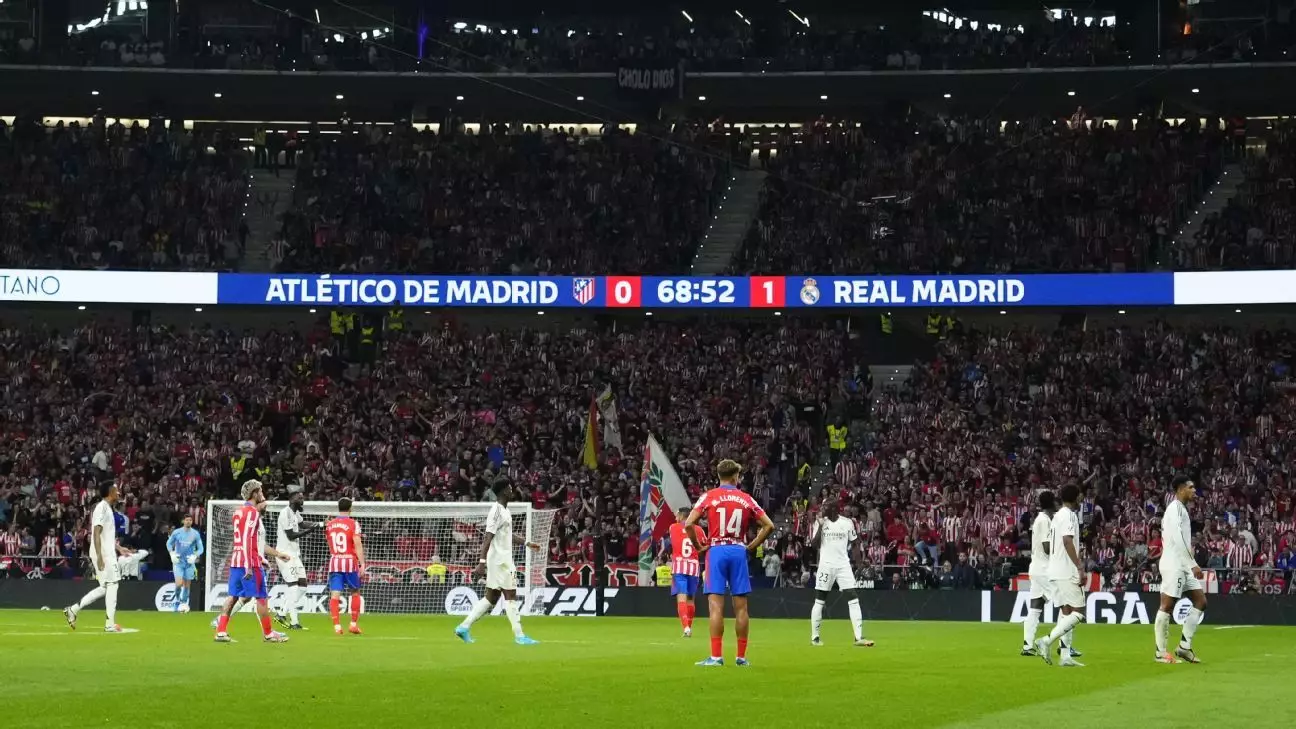On a seemingly ordinary Sunday night in Madrid, the air was thick with anticipation as Atletico Madrid hosted Real Madrid for a highly charged derby. The tension that accompanies such matchups was palpable, but the on-field excitement took a dark turn when, at 68:30 on the stadium scoreboard, the match was suspended. This decision arose just after Real Madrid had taken a crucial lead, thanks to Éder Militão’s goal, and less than 30 minutes remained on the clock. The vibrant atmosphere of the Metropolitano turned into a powder keg as frustrations boiled over and fans began hurling objects onto the pitch.
The immediate trigger for the chaos was Militão’s exuberant celebration. As a former Atletico player, goalkeeper Thibaut Courtois’s rapturous response ignited the crowd’s anger, leading to lighters and plastic bottles being thrown in his direction. This incident highlighted not only the intensity of the rival fan bases but also the underlying issues festering in the realm of football fandom.
Referee Mateo Busquets Ferrer faced a formidable challenge in addressing the hostile actions from the stands. After Courtois reported the unruly behavior, the referee made an initial plea to the crowd over the loudspeakers. This transparency in communication served as a warning but ultimately fell on deaf ears as fan misconduct continued, prompting the match to be halted entirely.
After consulting with both coaches, Busquets Ferrer opted for a suspension that would last at least ten minutes. This decision, though practical, reminded spectators that the beautiful game could be marred by its darker elements. Ancelotti, Real Madrid’s manager, later deemed the stoppage a necessary response, expressing support for the referee’s tough choice amid difficult circumstances.
The post-match reflections from both teams’ leaders brought nuanced insights into the events. Diego Simeone, Atletico’s manager, as well as Koke, the team captain, both pointed out that the players also bear responsibility for the emotional volatility within the stadium. Their remarks pointed to a critical lesson about the relationship between athletes and their fans. Simeone emphasized that provocative celebrations in such a heated environment could fuel negative reactions. Koke echoed this sentiment, advocating for a more mindful approach during goal celebrations to quell unnecessary tensions.
Such conversations revealed a shared acknowledgment that players are caretakers of the atmosphere they help create. In a sport where emotions run high, the actions of a few can sometimes trigger a cascade of negative responses from the many.
Later in the evening, Atletico Madrid’s club issued a statement condemning the actions of the few fans responsible for the chaos. While they expressed solidarity with the broader fanbase, the club also pledged to work with law enforcement to address the troubling incidents. This included identifying those who participated in the violent throwing of objects.
The club’s internal disciplinary measures also sent a clear message: behavior symptomatic of violence or aggression towards players cannot be tolerated under any circumstances. The dialogue surrounding fan misconduct at games is vital, highlighting the need for accountability and a culture shift within stadiums.
The derby concluded after resuming play, with a dramatic late equalizer and subsequent red card that overshadowed earlier events. However, the primary discourse of the night circulated around the disturbances and what they signify for the future of derby clashes. Observers debated the appropriateness of fan reactions, the responsibilities of the players, and the effectiveness of current measures to ensure safety within stadiums.
As the crowd erupted in whistles at the end of the match while Atletico players celebrated, it became clear that the aftermath of this derby would linger long after the final whistle. The potential for future chaos looms as clubs, players, and fans must engage in a collective effort to foster a supportive, respectful environment amid fervor and excitement.
This derby serves as a chilling reminder of how quickly passion can devolve into turmoil, necessitating a concerted effort from all stakeholders involved to safeguard the integrity of the beautiful game. A re-evaluation of conduct, both on and off the pitch, is essential to ensuring that football remains a site of joy and unity rather than a battleground for animosity.

